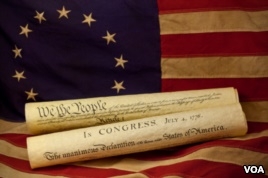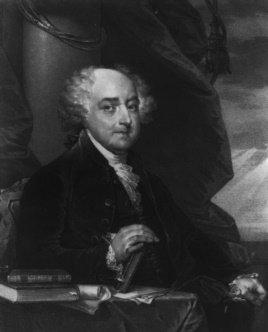From VOA Learning English, welcome to The Making of a Nation. American history in Special English. I'm Steve Ember.
This week in our series, we continue the story of America's second president, John Adams. He took office in 1797. He had served eight years as vice president under President George Washington. Now, state electors had chosen him to govern the new nation.
Adams was an intelligent man. He was a patriot and an able diplomat. But he did not like party politics. This dislike caused trouble during his presidency because two political parties struggled for power during his time in office. Adams was caught in the middle.

Making of a Nation
John Adams was a member of the Federalist Party. As president, he should have been party leader. But this position belonged to a man who really knew how to get and use political power, Alexander Hamilton.
Hamilton had served as treasury secretary under President Washington. Now, Hamilton was a private citizen, a lawyer in New York City. But he continued to have great influence over the national government. Federalists loyal to Hamilton controlled the Congress.
Even President Adams' top cabinet secretaries were loyal to Hamilton. In fact, they worked together against the new president.
This political situation made Adams' term in office very difficult. It also led to the end of Federalist Party power.
John Ferling is a professor emeritus of history at the University of West Georgia. He has written many books about early American history. He says every 50 years or so the country experiences a period of extreme partisanship. He says the late 1700s were such a time. That partisanship helped split the Federalist Party.

John Adams
"It was a group under Hamilton who were called the ultra-federalists, or the high federalists, at the time that were making war on the centrists. In their case it resulted really in the destruction of the Federalist Party. They never were a viable party again after the election of 1800."
Two major issues marked Adams' presidency. One concerned foreign policy. The other concerned the rights of citizens.
The first involved America's relations with France. Americans were divided on whether to support the revolution in France. At first, many saw it as similar to the American Revolution against Britain. Vice President Thomas Jefferson, especially, supported the French.
France helped America win its war for independence from Britain. The countries' friendship continued when Thomas Jefferson served as minister to Paris.
But many Federalists came to strongly oppose the revolution in France. They were horrified by the execution of the French king and queen. They did not like the idea of common people taking power. Federalists wanted an alliance with Britain. Over time, they demanded war with France. They used their power to prevent the American government from sending a pro-French representative to Paris. They also searched for any signs of insult, any excuse to declare war.
John Ferling says President Adams did not agree with the majority of Federalists.
"Adams, from the very beginning, seeks what he called an honorable peace. He tried to look for some sort of central position, centrist position, between the radical conservatives on the right and the radical liberals on the left."
Adams was afraid that the French Revolution would destroy America. He believed the American economy and government would collapse if the country became involved in Europe's struggle. So Adams tried to improve relations with France through negotiations. At the same time, Adams strengthened America's defenses. We will be ready, he said, if war comes.
The "X, Y, and Z Affair" threatens war with France...
One incident, especially, brought France and America close to war. It is known in American history books as the "X, Y and Z Affair."
President Adams had appointed a committee of ministers to negotiate with the French government. French officials kept the ministers waiting for several weeks. While they waited, the ministers had a visit from three Frenchmen -- later called X, Y and Z.
X, Y and Z told the American ministers that France would sign an agreement if the United States did three things.
It had to lend the French government $12 million. It had to apologize for anti-French statements in a recent message from President Adams to the American Congress. And it had to pay the French foreign minister $250,000.
The American ministers were willing to pay. But they wanted to sign the agreement first. The French foreign minister refused. First the money, then the agreement.
The Federalists finally had the excuse they were looking for. France had insulted the United States. The only answer was war, they said. Federalist newspapers added fuel to the fire by publishing anti-French propaganda. In a few places, pro-war groups became violent.
The Republican Party could do little. Even Thomas Jefferson was helpless. He remained in Philadelphia, the capital of the United States at that time. But he had few friends there anymore.
Congress quickly passed laws to create a permanent army and navy. It also approved new taxes to pay for them.
And it passed two new laws by a narrow majority. These laws greatly increased the powers of the national government. They were known as the Alien and Sedition Acts. Federalists said the laws were necessary to protect national security. But, in effect, the Federalists used them to weaken the power of the Republican Party.
Under the Alien Act, the president could accuse any foreigner living in the United States of being a threat to national security. He could order that person out of the country.
The act also increased the time a foreigner had to wait to become a citizen, from five years to 14 years.
Republicans were furious. Most foreigners, when they became naturalized citizens, joined the Republican Party.
Republicans argued that the Alien Act violated the Constitution. They said it gave the government more powers than were stated in the Constitution. Federalists said the act was constitutional. They said the Constitution gave the government the right to defend the country against foreign aggression.
The other law, the Sedition Act, barred the publication of anything that might incite public hostility against the government.
Republicans argued that this act violated Americans' constitutional rights of free speech and a free press. Federalists, once again, defended it as necessary for national security.
The Federalists tried to use the Sedition Act to quiet Republican critics of President Adams' administration. About 25 people were charged under the Sedition Act. These included several leading Republican newspapermen and a Republican member of Congress.
Some of the men were tried, found guilty, and sent to prison. But other Republicans took their places in the fight against the act. The Federalist plan to stop criticism did not succeed.
President Adams had signed the Alien and Sedition Acts into law. He believed they were necessary to protect the United States at a time when war with France was still possible. And his wife, Abigail, believed that passing the laws would stop newspapers from criticizing him.
"The one piece of advice that she offers that is unfortunate and is, in fact, catastrophic is that she really urges him to pass the Alien and Sedition Acts, which becomes the biggest blunder of his presidency."
Joseph Ellis is a history professor at Mt. Holyoke College and the author of a book about John and Abigail Adams. He says Adams regretted passing the laws.
In early 1799, Adams received several reports that France was ready to reopen negotiations on improving relations. He immediately nominated a new minister to France. Federalist senators threatened to reject the nomination. In the end, Adams agreed to nominate a committee of three ministers. The Senate approved them.
It was many months before the three men went to France to negotiate the agreement. And it was many more months before they completed their work. But they did so on September 30, 1800.
After several years of bitter political struggle at home, President Adams finally prevented war with France. Later he wrote that there was one thing he would like to be remembered for more than anything else. He gave himself the task of making peace with France, and he succeeded.
"We can't say that about every American president. But we can say it about John Adams."
Historian John Ferling says he believes the United States would not have survived if the Americans had gone to war with France. Historian Joseph Ellis agrees.
"I think that the long term achievement of the Adams' presidency is to preserve the coherence of a stable government and to see that the revolution survives and consolidates its energies and continues on into the 19th century."
Eighteen hundred was another presidential election year in the United States. The Federalist Party appeared to be dying.
It failed in its effort to force the nation into war with France. And it failed to silence its critics through the Alien and Sedition Acts. Party leaders knew the election would be their last chance to keep political power.
The Republican Party had more popular support. It also had gained an increasing number of seats in state legislatures and in Congress. Party leader Thomas Jefferson was sure to be elected president -- unless the Federalists could find a way to change the electoral process.
The election of 1800 will be our story next week.
I'm Steve Ember, inviting you to join us again here on VOA Learning English for The Making of a Nation. American history in Special English.











